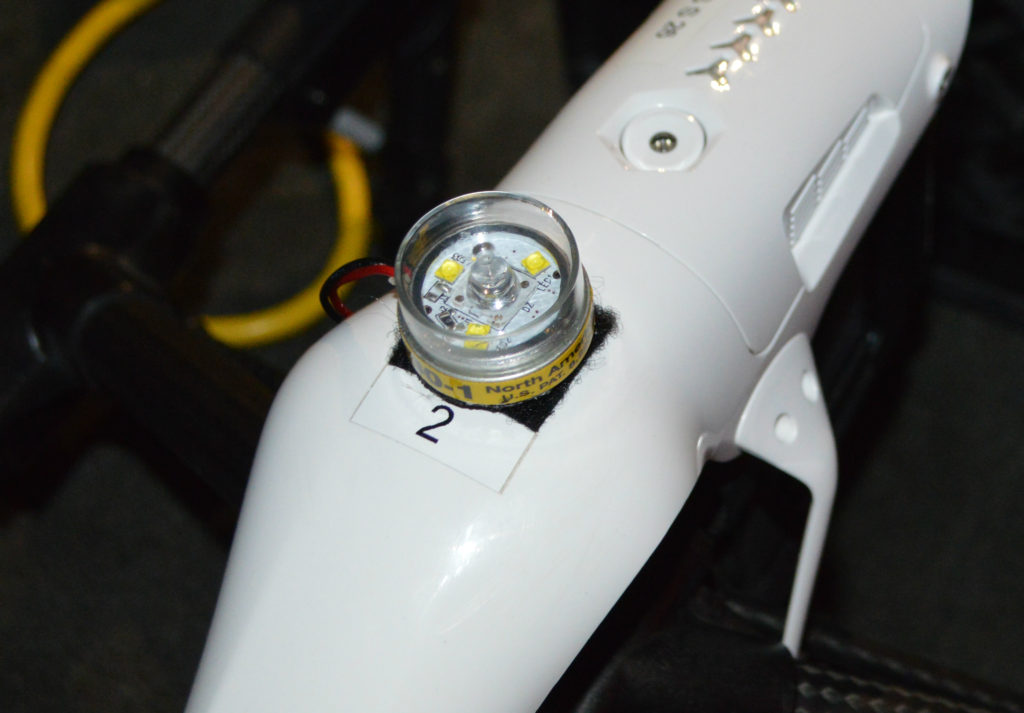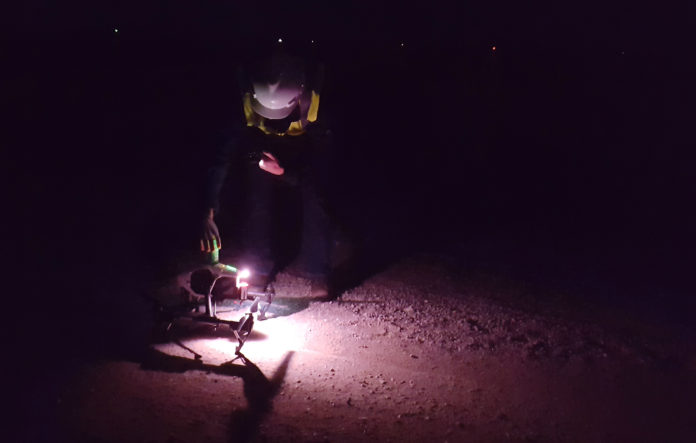Press
November 17, 2016
GRAND FORKS, N.D. — SkySkopes is now the first North Dakotan unmanned aircraft systems company to receive permission from the Federal Aviation Administration to fly at night under the agency’s recently implemented UAS rules.

November 17, 2016
GRAND FORKS, N.D. — SkySkopes is now the first North Dakotan unmanned aircraft systems company to receive permission from the Federal Aviation Administration to fly at night under the agency’s recently implemented UAS rules.
The Grand Forks-based flight services firm completed its first set of nighttime flights successfully on Nov. 10 in cooperation with Xcel Energy as part of a research project that is exploring the use of drones to assess storm damage.

Xcel Energy arranged for a drone to fly at night over staged storm damage in Mayville, N.D.,
to see whether thermal cameras could detect problems such as severed power lines and downed utility poles during the day and night.
“Developing this technology allows us to explore ways we can improve reliability and safety to better serve our customers,” said Michael Lamb, Xcel Energy Vice President operating services and enterprise transformation office. “We’re pleased to collaborate with SkySkopes as we work to reduce outage times while also saving time and money.”
The FAA approved SkySkopes’ request to operate during the night. Under current federal law, operating unmanned aircraft is only allowed during the day, but commercial users can apply for waivers to conduct night operations.
“These permissions are a game-changer for the North Dakotan UAS ecosystem,” SkySkopes President and CEO Matt Dunlevy said.
The waiver allows SkySkopes to operate aircraft after sunset and before sunrise. Flying at night is advantageous in numerous applications for SkySkopes customers including security surveillance, search and rescue, and storm damage assessment.
“Night operations give SkySkopes the ability to deliver higher fidelity data solutions to our customers because of the increased effectiveness of thermal imagery,” said Mike Johnson, SkySkopes director of flight operations.
Because of the cooler and more consistent temperatures at night, thermal imagery is more effective because of the increased temperature contrast between people or objects and the surrounding environment.
“Not only do night operations increase the quality of service we can provide, it truly gives us more hours in the day to fly as we enter into the winter months,” Johnson said.
As part of the waiver process, SkySkopes will ensure aircraft are operated with anti-collision strobe lights and certify all pilots in the intricacies of night flying to ensure the highest level of safety during night operations.
The FAA has approved 146 waivers for flights under its recently implemented Part 107 rules for the operation of commercial unmanned aircraft. Of those granted since Aug. 29, 140 have received permission to conduct nighttime operations. Companies received permission to fly at night under the FAA’s previous exemption system but those flying under Part 107 must seek permissions under those rules as well.
SkySkopes was the first North Dakota startup legally approved by the Federal Aviation Administration to fly unmanned aircraft for business purposes and has grown to the scale of national and international operations. SkySkopes employs nearly 20 pilots and flies its large fleet of aircraft for industrial inspection, security purposes, precision agriculture, training certification, and other uses. For more information, visit www.skyskopes.com or follow SkySkopes on Facebook, Twitter and Instagram.
Xcel Energy (NYSE: XEL) provides the energy that powers millions of homes and businesses across eight Western and Midwestern states. Headquartered in Minneapolis, the company is an industry leader in responsibly reducing carbon emissions and producing and delivering clean energy solutions from a variety of renewable sources at competitive prices. For more information, visit xcelenergy.com or follow us on Twitter and Facebook.
to see whether thermal cameras could detect problems such as severed power lines and downed utility poles during the day and night.
“Developing this technology allows us to explore ways we can improve reliability and safety to better serve our customers,” said Michael Lamb, Xcel Energy Vice President operating services and enterprise transformation office. “We’re pleased to collaborate with SkySkopes as we work to reduce outage times while also saving time and money.”
The FAA approved SkySkopes’ request to operate during the night. Under current federal law, operating unmanned aircraft is only allowed during the day, but commercial users can apply for waivers to conduct night operations.
“These permissions are a game-changer for the North Dakotan UAS ecosystem,” SkySkopes President and CEO Matt Dunlevy said.
The waiver allows SkySkopes to operate aircraft after sunset and before sunrise. Flying at night is advantageous in numerous applications for SkySkopes customers including security surveillance, search and rescue, and storm damage assessment.
“Night operations give SkySkopes the ability to deliver higher fidelity data solutions to our customers because of the increased effectiveness of thermal imagery,” said Mike Johnson, SkySkopes director of flight operations.
Because of the cooler and more consistent temperatures at night, thermal imagery is more effective because of the increased temperature contrast between people or objects and the surrounding environment.
“Not only do night operations increase the quality of service we can provide, it truly gives us more hours in the day to fly as we enter into the winter months,” Johnson said.
As part of the waiver process, SkySkopes will ensure aircraft are operated with anti-collision strobe lights and certify all pilots in the intricacies of night flying to ensure the highest level of safety during night operations.
The FAA has approved 146 waivers for flights under its recently implemented Part 107 rules for the operation of commercial unmanned aircraft. Of those granted since Aug. 29, 140 have received permission to conduct nighttime operations. Companies received permission to fly at night under the FAA’s previous exemption system but those flying under Part 107 must seek permissions under those rules as well.
SkySkopes was the first North Dakota startup legally approved by the Federal Aviation Administration to fly unmanned aircraft for business purposes and has grown to the scale of national and international operations. SkySkopes employs nearly 20 pilots and flies its large fleet of aircraft for industrial inspection, security purposes, precision agriculture, training certification, and other uses. For more information, visit www.skyskopes.com or follow SkySkopes on Facebook, Twitter and Instagram.
Xcel Energy (NYSE: XEL) provides the energy that powers millions of homes and businesses across eight Western and Midwestern states. Headquartered in Minneapolis, the company is an industry leader in responsibly reducing carbon emissions and producing and delivering clean energy solutions from a variety of renewable sources at competitive prices. For more information, visit xcelenergy.com or follow us on Twitter and Facebook.
Read more at:

No comments:
Post a Comment